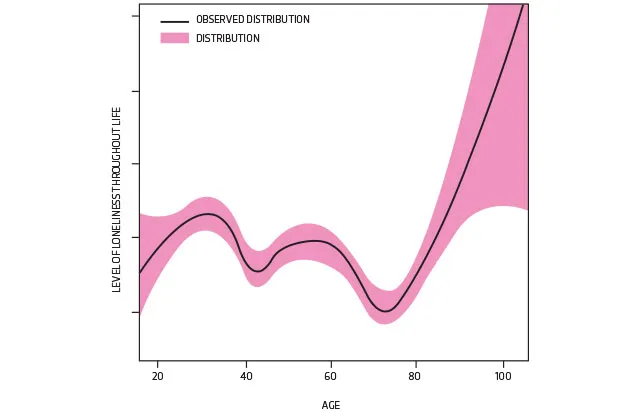Today, society is becoming ever more divided. But if there is one thing that’s bringing everyone together, it’s loneliness. Scientists, doctors, charity workers and politicians from across the political spectrum all agree that the loneliness epidemic is a big problem.
A report published in December 2017 by the Jo Cox Commission revealed the staggering extent of loneliness in the UK. Almost one-quarter of parents surveyed by the charity Action for Children said they were “always or often lonely”, more than one-third of people aged 75 and over told Independent Age that their “feelings of loneliness are out of their control”, and over the course of a year more than 4,000 children called Childline because they felt unbearably lonely – some as young as six years old. One recent study found that nine million adults in the UK suffer from chronic loneliness: if all the lonely people moved to one city, it would be bigger than London.
This isn’t just sad – it’s dangerous. Research shows that experiencing chronic loneliness is as bad for our health as smoking 15 cigarettes a day, and worse than obesity. It is associated with an increased risk of developing coronary heart disease and stroke, and increases your likelihood of early mortality by 26 per cent.
But how does this happen? How can an emotional experience be so bad for our physical health? Prof Steve Cole, a medicine and genomics researcher at the University of California, Los Angeles, says part of the answer may lie in the impact loneliness has on our immune system. His research shows that people experiencing chronic loneliness undergo a shift in the molecular programming of their immune cells: instead of being primed to fight viruses, their bodies prepare to fight bacterial infection – the kind that follows a wound or injury. This is the temporary state the body switches into with the fight-or-flight response; the crucial difference is that lonely people get stuck there.
Long term, this leads to higher levels of inflammation, which in turn contributes to cancer, heart attacks, Alzheimer’s and depression. “Loneliness, oddly enough, is one of the most threatening states we confront,” Cole explains.
Prickly people
But this response to loneliness can also affect our brains, leading us to behave in ways that leave us even more isolated. When these inflammatory signals reach the brain, they change certain aspects of how it functions, including social motivation, making us more defensive, guarded and prickly – not exactly the state of mind best suited to a party mood.
Scientists have seen this happen in brain scans: in a study that investigated the hyper-vigilance of lonely people, participants had their brain activity monitored while they were shown images picturing a social threat, such as bullying, and a non-social threat, such as a shark. The researchers found that lonely people responded faster to social threats than to other kinds of dangers, beating the participants who weren’t lonely. This could help explain why some people become entrenched in their loneliness: when we start to feel isolated, it can make social interaction feel like a more alarming experience, as we can become more attuned to potential threats in the facial expressions and body language of those around us.
That can make us feel more suspicious and less inclined to connect with others, which can leave us feeling even more isolated. “That lonely immune biology feeds back to the brain in ways that might exacerbate and potentially perpetuate loneliness, leading to a vicious cycle of loneliness begetting biology, which in turn begets loneliness,” says Cole.

It turns out we are even lonely when we’re asleep. A recent study into 2,000 young adults by postdoctoral researcher Dr Timothy Matthews at King’s College London found that lonelier people reported poorer sleep than non-lonely peers, and were 24 per cent more likely to feel tired and have difficulty concentrating during the day – an association that remained after controlling for mental health problems. The link was almost 70 per cent stronger among those who had been exposed to severe forms of violence in their teenage years.
“When you feel like you’re on your own, the world seems like a more threatening place, which could make it harder to sleep restfully,” Matthews says. “This perception of threat in the environment seems to be even stronger for people who’ve been exposed to an objective threat during their lives, such as being a victim of violence.” This also helps us understand why lonely people’s immune systems could be primed to fight bacterial infection from a wound, rather than viral infection; they are anticipating being attacked by a predator, with no tribe to defend them.
These findings fit with the evolutionary theory of loneliness. “The theory goes that humans are social creatures and our ancestors would have needed to stick together in groups in order to succeed, so having an instinctive aversion to being isolated would have served an adaptive purpose. Just as hunger is your body’s way of telling you that you need to eat, loneliness is like an alarm bell signalling that you need to reconnect with people,” explains Matthews. Loneliness is a kind of social hunger – it’s a message telling us we need to feed our social selves.
But when it comes to working out how to do that, we still have a long way to go. Much of that is to do with attitudes, says Dr Farhana Mann, a psychiatrist at University College London: “People will go to their GP and tell them about whatever lesion they have, but saying they’re lonely is just too embarrassing. We need to give people a sense that it is absolutely legitimate to talk openly to their GP or other health professionals about this, because it’s a genuine health issue.”
Group chat
Mann hopes that in the coming months and years, we’ll see more social prescribing, where isolated people are referred to a local organisation with expertise in what is going on in the area, so patients can nurture their social relationships. Alongside this, she wants to see more community development where local residents decide what activities they want to engage in, using the skills that members of the communities already have.
“There’s no point rushing in to set up groups without talking to the people who make up that community,” says Mann. For example, you could end up bringing Beethoven concerts to an area where everybody wants a gardening and a cooking group. And groups that already exist for other purposes – such as diabetes management groups, for example – can be better used to combat social isolation. “Although they are not for loneliness on the label, they may work just as well, because the effect of being in a group of people with a shared experience could have a positive impact,” she adds.

There is a lot that we still don’t understand about loneliness – particularly when it comes to mental health. “There is certainly evidence for a strong link between depression and loneliness; being lonely makes you more likely to get depressed, and if you are depressed you are more likely to experience loneliness,” says Mann. But it is not the same with all mental health problems, and that is where more research is needed. “There is far less evidence about the experience of loneliness for people with other diagnoses like schizophrenia, bipolar disorders, or anxiety disorders. The subtlety of the nature of your mental health problem may influence how you experience isolation, and in turn what you find helpful,” she says.
A counterintuitive finding to come out of recent research is that increasing social networks of lonely people is not always the appropriate intervention. Loneliness and social isolation are not the same; many individuals feel lonely even when surrounded by people. “Some people who feel lonely have cognitive biases that make them interpret their relationships as not being satisfying or truly meaningful, so those friends are not really true friends somehow,” says Prof Louise Arsenault, a developmental psychologist at King’s College London. “I think that people should not focus on how many friends they have, but should focus on one or two relationships only, to make those satisfying and meaningful, so they can really discover the meaning of friendship.”
- This is an extract from issue 319 ofBBC Focusmagazine. Subscribeand get the full article delivered to your door, or download theBBC Focusapp to read it on your smartphone or tablet.Find out more
Follow Science Focus onTwitter,Facebook, Instagramand Flipboard
